I work at a large distribution warehouse in Melbourne’s west. Every day a tug of war plays out over how we spend our time. The bosses want everything done at breakneck speed, with little regard for our health or well-being. They make work – especially the physical, repetitive work of modern warehouses – into a monotonous, alienating experience.
But, like many other workplaces, in the last hour before knock-off, the shop floor is notably less frenetic than the rest of the time. By then, it is the bathrooms that are a hotbed of activity. We congregate to exchange gossip, compare plans for the weekend and discuss the footy.
It’s our way of getting some of that time back and ensuring we get a little rest. We’ve all been there: sneaking in that extra toilet break, checking Facebook in some secret corner and slowing right down for the last hour or two of work.
Just as the bosses hate it, we see every second that we aren’t working as a small win.
Of course, all of this is completely unacceptable to management. In a warehouse, advanced voice-picking technology tracks our every minute, and management is always on the prowl. They pull us into disciplinary meetings if the slightest gap appears in our work. We have to meet strict productivity targets, or else.
Practically the only time you see managers doing anything is when they are sitting across the table from you pointing out the holes they’ve spotted in your “productivity”.
We have to develop sophisticated ways to cover for ourselves and each other when we’re taking it easy. But that’s okay; we’ve got eight to 10 hours each day to do just that.
Of course, the oppressive way our time is micromanaged is seen as perfectly reasonable, indeed vital, to capitalism. The time we take for ourselves represents the most grievous theft (of our own time) from the bosses. We are called “bludgers” for taking it.
They employ an army of managers, computers and robots to watch us and work out how better to claw back every one of those stolen seconds. Earlier this year, reporters at a major UK newspaper returned after the weekend to find motion sensors had been installed underneath their desks.
In October, management at a mining site in Western Australia were exposed for using drones to spy on workers. Records were being kept of the moments it appeared that workers were “talking and relaxing idly during work hours”.
Just as the bosses hate it, we see every second that we aren’t working as a small win. It might not seem like much, and we’re not going to conquer the world with extra toilet breaks, but these little struggles over time are a small act of defiance – proof that we are not robots.










